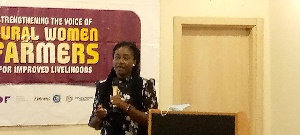 Dr Priscilla Twumasi Baffour, Lecturer, University of Ghana
Dr Priscilla Twumasi Baffour, Lecturer, University of Ghana
Dr Priscilla Twumasi Baffour, a Lecturer of Economics at the University of Ghana, says the country needs to patronize and consume local products to boost the local economy.
She said COVID-19 had taught the country a lesson in improving local production and consumption; “this was the only way to make the economy resilient against unintended shocks like the pandemic”.
Dr Baffour said this at the Network for Women’s Rights in Ghana’s (NETRIGHT) National Policy Dialogue on the theme: “Women’s Livelihood, COVID-19 and the Ghanaian Economy.”
The policy dialogue sought to make inputs into policy formulation in regards to improving women’s livelihood post-COVID-19.
She said it was important that the government diversified the economy in the agriculture value-chain, to create jobs, and facilitate economic growth.
She said agriculture over the years had not been a major component of economic growth because it had not been mechanized, though it had a large number of the population in practice.
“Our agriculture sector is not making the kind of inroads it should make. The sector needs to be industrialized, where produce in their raw forms will be processed into finished products to feed the local economy,” she said.
Dr Baffour said in growing the economy post-COVID-19, policymakers needed to improve domestic revenue mobilization by enlarging the tax base and ensure compliance.
She said the informal sector was an area where tax mobilization was low, saying, the government needed to ‘cash in' on the sector to undertake post-COVID-19 programmes.
“Government must rationalize the public sector to avoid waste in the sector,” she said.
Dr Baffour said these measures if adopted, would help curb the downward trend of Gross Domestic Product as well as make the country economically resilient in these trying times.
Madam Patricia Blankson Akakpo, Programme Manager of NETRIGHT, said the policy dialogue intended to make inputs into policy-making on issues that affected women and the vulnerable.
She said women were heavily hit by the pandemic, saying, they formed the majority of those who lost their jobs and incomes in the formal and informal sectors of the economy.
“For most women in Ghana, the pandemic meant no job, no unemployment benefits or other social safety nets. For many, aside losing income, unpaid care work burden has increased,” she said.
She said the policy dialogue aims at providing data, evidence, and recommendations for policymakers on addressing the challenges faced by women and vulnerable populations during the COVID-19 pandemic.
"We will interrogate the shortfalls of COVID-19 and its implications on women’s livelihoods, and the economy to equip policy makers and other key stakeholders with evidence to drive gender," she said.
The Programme Manager said it was also to develop action-oriented recommendations that support the gender-responsive implementation of COVID-19 interventions.